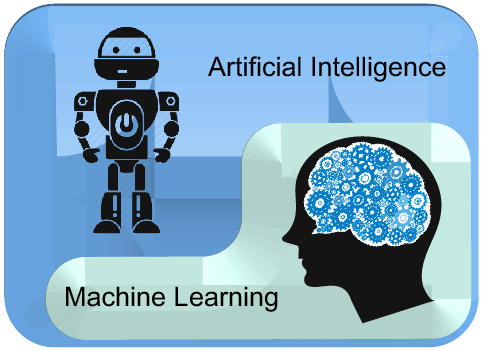Understanding the difference between Machine Learning and Artificial Intelligence
AI VS ML?

Artificial Intelligence
Artificial intelligence is a field of computer science which makes a computer system that can mimic human intelligence. It is comprised of two words "Artificial" and "intelligence", which means "a human-made thinking power."
Artificial intelligence is a technology using which we can create intelligent systems that can simulate human intelligence.
Machine learning
Machine learning is about extracting knowledge from the data.
Machine learning is a subfield of artificial intelligence, which enables machines to learn from past data or experiences without being explicitly programmed.
 The disparities between machine learning and artificial intelligence, highlighting their respective points.
The disparities between machine learning and artificial intelligence, highlighting their respective points.
1. Definition:
Machine Learning (ML): Machine learning is a subset of artificial intelligence that focuses on enabling machines to learn from data without being explicitly programmed. It involves algorithms that iteratively learn patterns and make decisions or predictions based on the data provided.
Artificial Intelligence (AI): Artificial intelligence, on the other hand, encompasses a broader scope. It refers to the simulation of human intelligence processes by machines, including learning, reasoning, problem-solving, perception, and language understanding.
2. Approach:
Machine Learning (ML): ML algorithms primarily rely on data to improve their performance over time. They analyze large datasets, identify patterns, and use them to make decisions or predictions. ML models can be categorized into supervised, unsupervised, semi-supervised, and reinforcement learning, each with its own learning approach.
Artificial Intelligence (AI): AI systems aim to replicate human cognitive abilities. They utilize various techniques, including ML, but also encompass other methodologies such as natural language processing (NLP), expert systems, computer vision, and robotics. Unlike ML, AI focuses on developing systems that can perform tasks autonomously, with a level of understanding and reasoning akin to human intelligence.
3. Application:
Machine Learning (ML): ML finds widespread applications across diverse domains, including finance, healthcare, marketing, e-commerce, and more. It powers recommendation systems, fraud detection algorithms, image and speech recognition systems, autonomous vehicles, and personalized medicine, among others.
Artificial Intelligence (AI): AI applications range from virtual assistants like Siri and Alexa to autonomous vehicles, facial recognition systems, chatbots, and automated decision-making systems. AI technologies are revolutionizing industries by automating repetitive tasks, augmenting human capabilities, and driving innovation.
4. Scope:
Machine Learning (ML): ML is primarily concerned with developing algorithms that can learn from data and improve their performance without human intervention. It focuses on solving specific tasks by optimizing for accuracy, precision, or other performance metrics.
Artificial Intelligence (AI): AI aims to create systems that can exhibit human-like intelligence across a wide range of tasks. This includes understanding natural language, recognizing objects in images, making decisions in complex environments, and adapting to new situations.
5. Evolution:
Machine Learning (ML): ML has witnessed significant advancements in recent years, driven by the availability of large datasets, improvements in computing power, and breakthroughs in algorithmic research. Deep learning, a subfield of ML, has revolutionized various applications by enabling the training of complex neural networks.
Artificial Intelligence (AI): AI has evolved from rule-based expert systems to sophisticated machine learning models capable of learning from vast amounts of data. Future developments in AI are expected to focus on achieving more generalized intelligence, capable of reasoning, learning, and adapting in diverse contexts.
In conclusion, while machine learning and artificial intelligence are intertwined concepts, they represent distinct paradigms within the field of technology. Machine learning is a subset of artificial intelligence, focusing on algorithms that can learn from data, while AI encompasses a broader spectrum of techniques and applications aimed at replicating human-like intelligence.
Compiled by: Pratiksha Bisht
Comments
Post a Comment